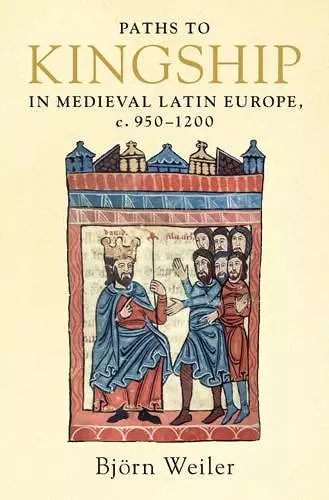Paths to Kingship in Medieval Latin Europe, c. 950–1200
Format:Hardback
Publisher:Cambridge University Press
Published:14th Oct '21
Should be back in stock very soon

This engaging study explores how a ruler's subjects shaped both the idea and the reality of power in Medieval Europe.
What did kingship mean to medieval Europeans - especially to those who did not wear a crown? From the training of heirs, to the deathbed of kings and the choosing of their successors, this engaging study explores how a ruler's subjects shaped both the idea and the reality of power.Medieval Europe was a world of kings, but what did this mean to those who did not themselves wear a crown? How could they prevent corrupt and evil men from seizing the throne? How could they ensure that rulers would not turn into tyrants? Drawing on a rich array of remarkable sources, this engaging study explores how the fears and hopes of a ruler's subjects shaped both the idea and the practice of power. It traces the inherent uncertainty of royal rule from the creation of kingship and the recurring crises of royal successions, through the education of heirs and the intrigue of medieval elections, to the splendour of a king's coronation, and the pivotal early years of his reign. Monks, crusaders, knights, kings (and those who wanted to be kings) are among a rich cast of characters who sought to make sense of and benefit from an institution that was an object of both desire and fear.
'From the different strategies for designating royal heirs, to the behind-the-scenes preparations for coronations, to the contested idea of sacral kingship, Weiler leaves no stone unturned in examining the process of becoming king during the central middle ages. This is an extraordinary transeuropean history on an impressive scale.' Jonathan Lyon, University of Chicago
'Weiler gives us a strikingly innovative comparative history of medieval kingship. The work spans all of medieval (Latin) Europe, with meticulously uniform attention to the acquisition, contestation, and retention of royal office - in the context of political communities, and the nexus of norm and practice. An instantly indispensable, magnificent achievement.' Piotr Górecki, University of California, Riverside
'W. B.'s challenge was to explain the secular society of the early Middle Ages using forms. This bet has been fully won, thanks to a careful reading of these documents, informed by a completely up-to-date international bibliography.' Simon MacLean, Francia recensio
'Weiler's thought-provoking work is rich in detail and will be a staple text for all those wishing to further their understanding of the nature of medieval kingship.' Stephen Donnachie, Royal Studies Journals
ISBN: 9781316518427
Dimensions: 235mm x 160mm x 30mm
Weight: 830g
300 pages